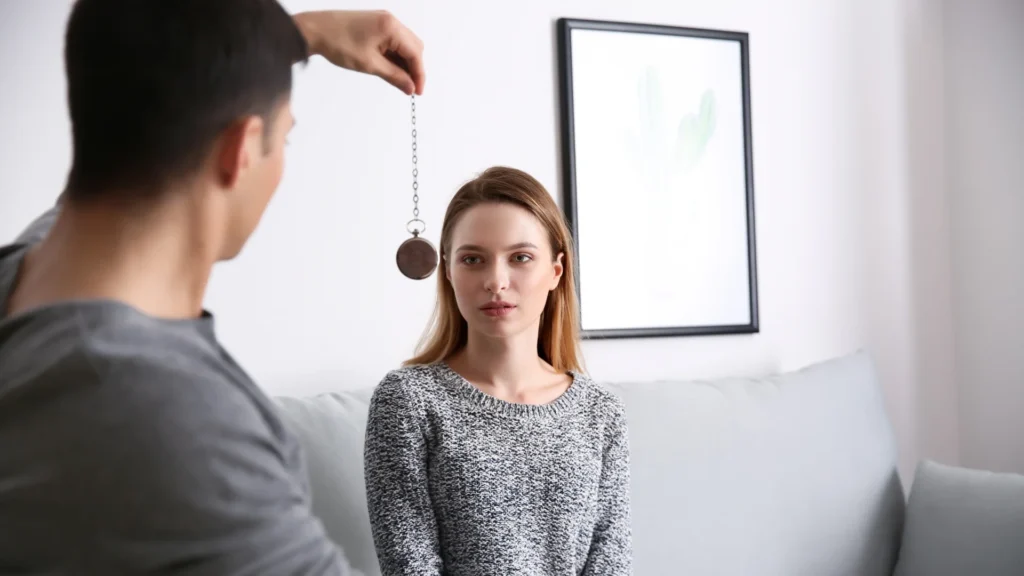Ever found yourself tossing and turning at night, desperately wishing for a magic switch to turn off your racing thoughts? Enter sleep hypnosis – a fascinating technique that’s capturing the attention of insomniacs and sleep enthusiasts alike. But what exactly is it, and could it be the key to unlocking those elusive z’s?
Imagine drifting off to sleep guided by a soothing voice, your mind and body relaxing deeper with each breath. Sleep hypnosis isn’t about swinging pocket watches or clucking like a chicken. It’s a science-backed method that aims to rewire your brain for better sleep.
From reducing anxiety to promoting deeper, more restorative rest, sleep hypnosis offers intriguing possibilities for those seeking a natural sleep aid. But does it really work? And if so, how can you harness its power?
Let’s dive into the world of sleep hypnosis and uncover its potential to transform your nights and energize your days.
What is Sleep Hypnosis?
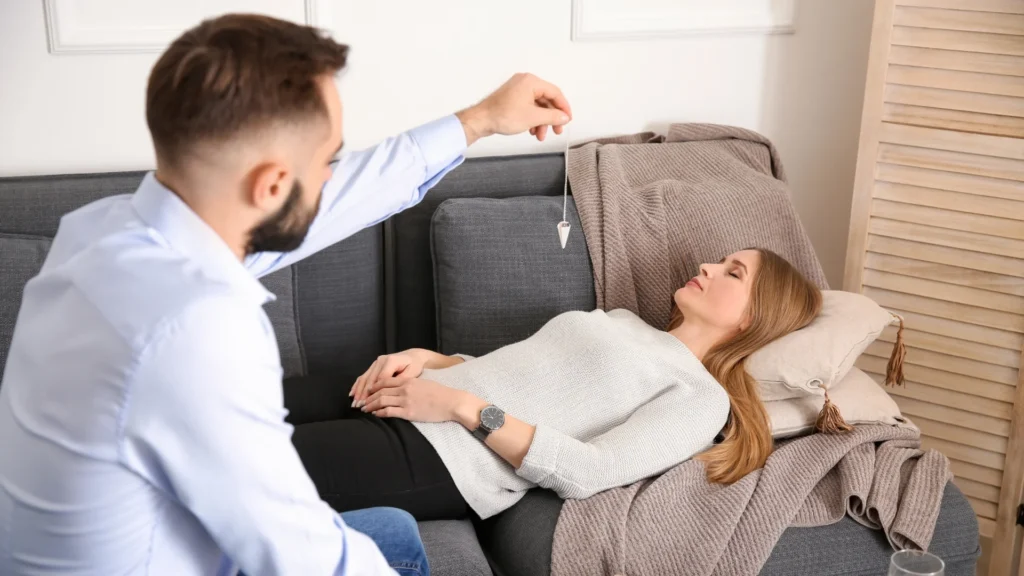
Sleep hypnosis is a relaxation technique that combines elements of hypnotherapy and meditation to promote better sleep. Unlike traditional hypnosis, sleep hypnosis aims to guide you into a state of deep relaxation conducive to falling asleep naturally.
During a sleep hypnosis session, you listen to a recording or a live practitioner who uses soothing words, imagery, and suggestions to help you relax both mentally and physically. The goal is to quiet your mind, reduce stress, and create an ideal environment for sleep.
Key aspects of sleep hypnosis include:
- Focused attention on calming thoughts or images
- Deep breathing exercises
- Progressive muscle relaxation
- Positive suggestions for improved sleep
Sleep hypnosis can be particularly helpful for those struggling with insomnia, anxiety-related sleep issues, or racing thoughts at bedtime. It works by addressing the mind-body connection, helping to reprogram negative thought patterns that may be interfering with your ability to fall asleep and stay asleep.
How Sleep Hypnosis Works

Sleep hypnosis works by guiding you into a state of deep relaxation and focused attention. During this process, a hypnotherapist or recording uses soothing words and calming imagery to help quiet your mind and relax your body. As you enter this tranquil state, your brain becomes more receptive to positive suggestions about sleep.
The key steps in sleep hypnosis include:
- Inducing relaxation through breathing exercises
- Focusing your attention on calming imagery
- Providing positive suggestions about sleep
These suggestions aim to reframe negative thoughts about sleep and promote healthier sleep habits. For example, you might be encouraged to visualize yourself falling asleep easily and waking up refreshed.
Sleep hypnosis doesn’t make you fall asleep during the session. Instead, it works to change your mindset and behaviors around sleep, potentially helping you drift off more easily when you go to bed. By addressing underlying anxieties and promoting relaxation, sleep hypnosis can create an ideal mental state for natural, restful sleep.
Are there any Potential Benefits of Sleep Hypnosis?
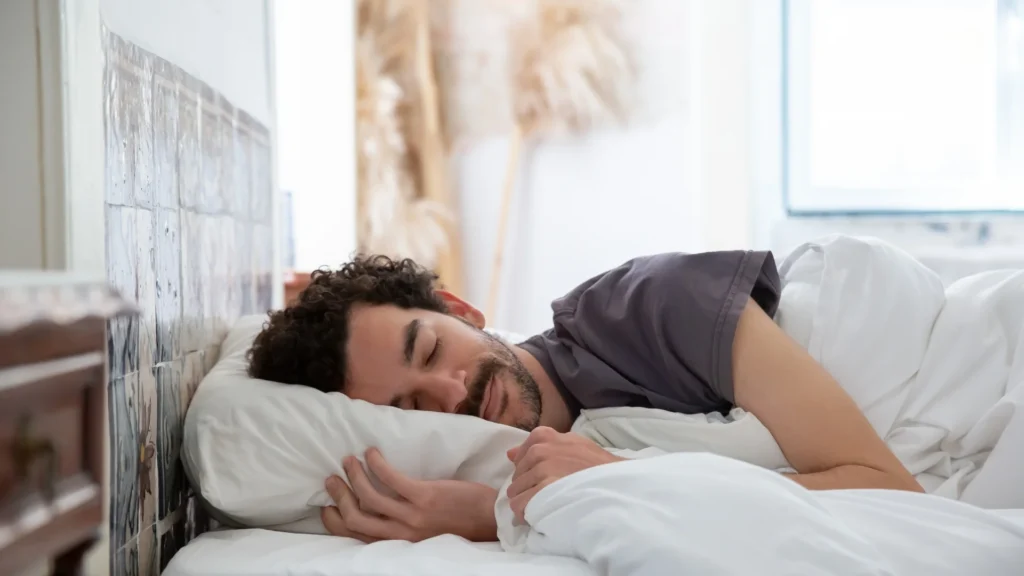
Sleep hypnosis offers several potential benefits for those struggling with sleep issues:
Improved Sleep Quality: Research suggests sleep hypnosis may increase slow-wave sleep, the deep, restorative stage of sleep, by up to 80% in some individuals.
Reduced Insomnia: Many studies report that sleep hypnosis can help people fall asleep faster and stay asleep longer.
Anxiety Relief: By promoting relaxation, sleep hypnosis may ease sleep-related anxiety, making it easier to drift off.
Management of Sleep Disorders: Some evidence indicates sleep hypnosis could help with conditions like sleepwalking and night terrors.
Addressing Comorbid Issues: Sleep hypnosis may also help manage related problems like hot flashes, night sweats, and chronic pain that can disrupt sleep.
Cost-Effective Solution: Compared to some other sleep interventions, sleep hypnosis can be a more affordable option, especially when self-administered.
While individual results may vary, sleep hypnosis offers a non-invasive and generally safe approach to improving sleep. As research continues, we may discover even more benefits of this promising sleep aid technique.
Common Techniques Used in Sleep Hypnosis

Sleep hypnosis employs several techniques to help people relax and improve their sleep quality. Here are some of the most common methods:
Progressive Muscle Relaxation: This technique involves tensing and then relaxing different muscle groups in the body. It helps release physical tension and promotes overall relaxation.
Guided Imagery: The hypnotist uses vivid, calming descriptions to help you visualize peaceful scenes. This might include picturing a serene beach or a quiet forest, engaging multiple senses to deepen relaxation.
Breathing Exercises: Controlled breathing techniques, such as deep diaphragmatic breathing, are often used in sleep hypnosis to slow down the heart rate and induce a state of calmness.
Positive Affirmations: The hypnotist may suggest positive statements about sleep, such as “I fall asleep easily and wake up refreshed.” These affirmations aim to reframe negative thoughts about sleep.
Countdown Methods: Techniques like counting backwards or visualizing descending stairs can help quiet the mind and transition into sleep.
Body Scan: This involves mentally scanning the body from head to toe, bringing awareness to each part and releasing tension.
These techniques are often combined in sleep hypnosis sessions to create a comprehensive approach to improving sleep. The goal is to quiet the mind, relax the body, and create positive associations with sleep.
Scientific Evidence and Studies
Research on sleep hypnosis has shown promising results, though more studies are needed to fully understand its effectiveness. Here are some key findings from scientific studies:
Increased Slow-Wave Sleep: A 2014 study published in the journal Sleep found that sleep hypnosis increased slow-wave sleep by up to 80% in some participants. This deep, restorative stage of sleep is crucial for physical and mental recovery.
Reduced Insomnia Symptoms: A systematic review in the Journal of Clinical Sleep Medicine analyzed 24 studies on sleep hypnosis. It found that 58.3% of the studies reported benefits for sleep outcomes, with improvements in falling asleep faster and staying asleep longer.
Anxiety Reduction: Several studies have shown that sleep hypnosis can help reduce anxiety related to sleep, making it easier for people to relax and drift off.
Limited Side Effects: The same systematic review noted a low incidence of adverse events from using sleep hypnosis, suggesting it’s generally safe for most people.
While these results are encouraging, it’s important to note that:
- Many studies have small sample sizes
- More research is needed on long-term effects
- Individual responses to sleep hypnosis can vary
Overall, the scientific evidence suggests that sleep hypnosis may be a helpful tool for improving sleep quality, especially for those struggling with insomnia or anxiety-related sleep issues. As research continues, we may gain a clearer understanding of its full potential and best applications.
How to Practice Sleep Hypnosis

Practicing sleep hypnosis can be done in several ways, whether through professional sessions or self-guided techniques. Here are some methods to get started:
Professional Hypnotherapy Sessions:
- Schedule appointments with a certified hypnotherapist specializing in sleep issues
- Attend in-person or virtual sessions tailored to your specific needs
Self-Guided Sleep Hypnosis:
- Use recorded audio sessions from reputable sources
- Practice regularly, ideally daily, for best results
- Choose a quiet, comfortable space for listening
- Use headphones to minimize distractions
Sleep Hypnosis Apps:
- Download apps like “Relax and Sleep Well Hypnosis” or others with high ratings
- Explore various themes and styles to find what works best for you
Creating a Routine:
- Listen to sleep hypnosis recordings at the same time each night
- Combine with other relaxation techniques like deep breathing or progressive muscle relaxation
Tips for Success:
- Be consistent with your practice
- Choose a comfortable position, but avoid falling asleep during the session if possible
- If you fall asleep, don’t worry – you may still benefit from the suggestions
Remember, the key to successful sleep hypnosis is repetition and consistency. With regular practice, you may find it easier to relax and drift off to sleep naturally. Always consult with a healthcare professional if you have persistent sleep issues or concerns.
Precautions and Considerations
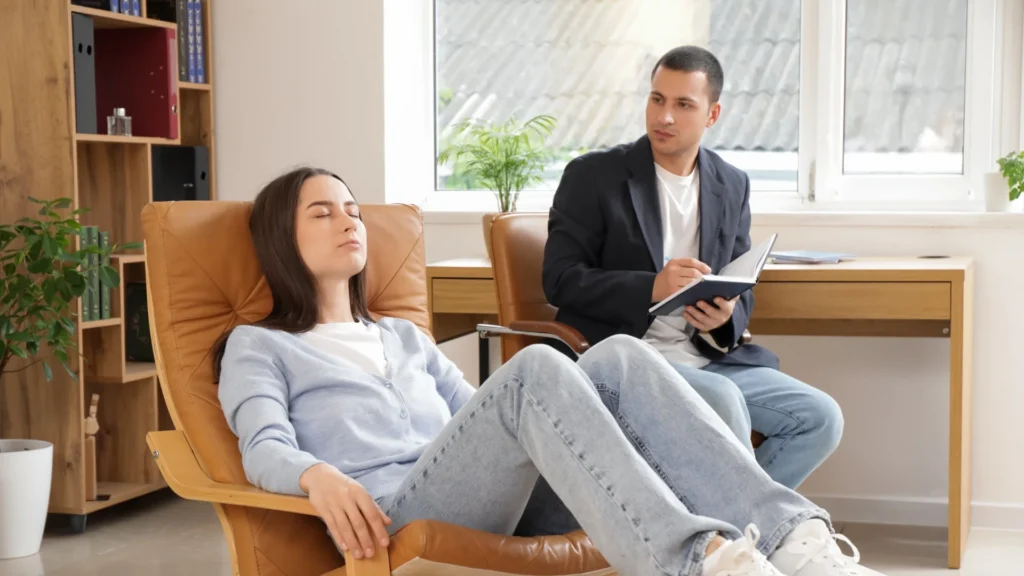
While sleep hypnosis is generally safe, there are some important factors to keep in mind:
Consult a Professional: Always talk to a healthcare provider before trying sleep hypnosis, especially if you have any underlying health conditions or sleep disorders.
Choose Qualified Practitioners: If seeking in-person hypnotherapy, ensure the practitioner is certified and experienced in sleep hypnosis.
Be Aware of Limitations: Sleep hypnosis may not work for everyone. About 15% of people are highly receptive, while others may see little to no effect.
Avoid Self-Diagnosis: Don’t use sleep hypnosis as a substitute for proper medical evaluation of sleep issues.
Potential Side Effects: Some people may experience mild side effects like headaches, dizziness, or anxiety.
Caution with Mental Health Conditions: Those with certain mental health disorders should be cautious and only use sleep hypnosis under professional guidance.
Combine with Good Sleep Hygiene: For best results, use sleep hypnosis alongside other healthy sleep practices.
Remember, sleep hypnosis is a complementary approach and should not replace medical treatment for serious sleep disorders.
Take the First Step Towards Better Sleep Tonight
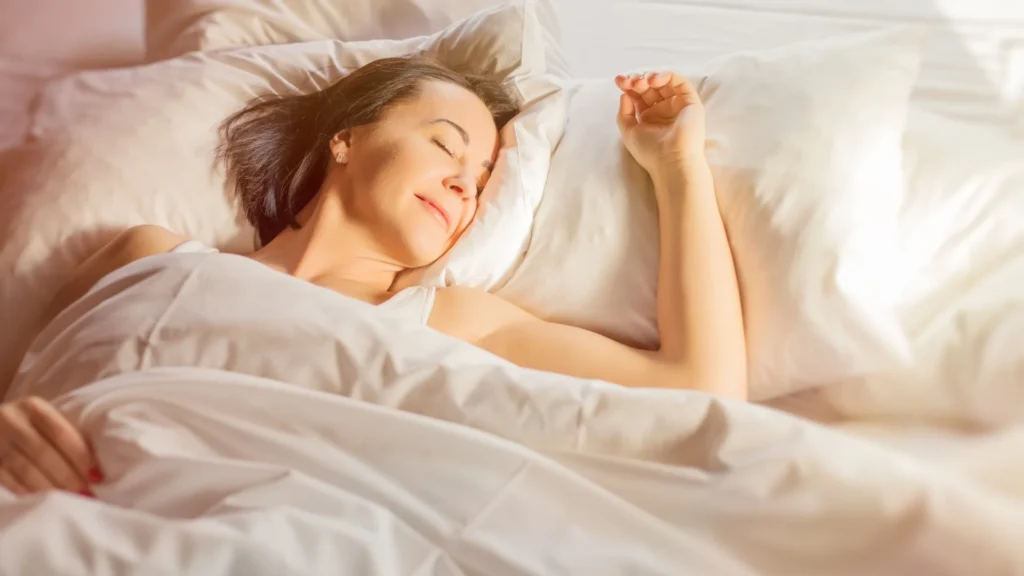
Sleep hypnosis offers a promising path to improved sleep quality and relaxation. From reducing anxiety to promoting deeper, more restorative rest, this technique has shown potential benefits for many struggling with sleep issues.
While not a magic solution, sleep hypnosis can be a valuable tool in your sleep improvement toolkit. It’s natural, generally safe, and can be practiced in the comfort of your own home.
Ready to give sleep hypnosis a try? Here’s what you can do:
- Research reputable sleep hypnosis recordings or apps
- Set aside time each night for practice
- Create a relaxing environment for your sessions
- Be patient and consistent in your approach
Remember, everyone’s sleep journey is unique. What works for one person may not work for another. If you have persistent sleep issues, always consult with a healthcare professional.
Take the first step tonight. You might be surprised at how a little guided relaxation can transform your nights and energize your days.
Read More Here: What is Postpartum Insomnia?

